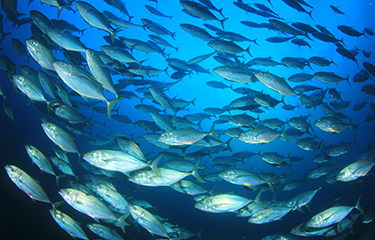In response to climate change, several marine species are moving away from the equator – something that could jeopardize livelihoods on Pacific island nations that depend on tuna fishing revenue.
According to a study published in the Proceedings of the National Academy of Sciences of the United States of America (PNAS), multiple species studied showed that marine biodiversity on a “global scale” has been responding to the warming climate.
“We show that marine species richness levels off or declines above a mean annual sea surface temperature of 20 degrees Celsius. This results in a dip in species richness around the equator that has become more pronounced as the climate has warmed, especially for pelagic species,” the report states.
The research – authored by Anthony Richardson, Chhaya Chaudhary, David Schoeman, and Mark John Costello – found that climate change is driving marine populations away from the equator, because it is becoming too hot. The research found that the region is no longer a viable environment to many species.
In an article written by the five authors, they said the shift could impact many Pacific island nations that sell licenses to fish in local waters to foreign fishing fleets.
“The changes we describe will also have profound implications for human livelihoods. For example, many tropical island nations depend on the revenue from tuna fishing fleets through the selling of licenses in their territorial waters,” the report said. “Highly mobile tuna species are likely to move rapidly toward the subtropics, potentially beyond sovereign waters of island nations.”
According to the Fisheries Forum Agency (FFA), government license and access fee revenues were placed at USD 500 million (EUR 411.3 million) in 2019, a record-breaking feat for the Pacific island nations.
It isn’t just the harvest side of the change that could harm the region’s economies either. To many Pacific island nations, the environment’s marine biodiversity also attracts tourism, and several island nations rely on tourism as an economic driver.
But, based on the study, even the rich species of sharks, manta rays, and sea turtles will move away from the tropics.
The study also found that when the same shift of marine species happened 252 million years ago, 90 percent of all marine species were decimated.
As one of the lead authors on the current 6th Assessment Report of the International Panel on Climate Change (IPCC), Costello said climate change is here – and is already affecting several sectors.
“Our work shows that human-caused climate change has already affected marine biodiversity at a global scale across all kinds of species. Climate change is with us now, and its pace is accelerating,” he said. “We can predict the general shift in species diversity, but because of the complexity of ecological interactions, it is unclear how species’ abundance and fisheries will change with climate change.”
The scientists added that not all is lost, and nations should work together to reduce carbon emissions to prevent further warming of waters in the equator and protect marine biodiversity.
Photo courtesy of Rich Carey/Shutterstock







